|
One of the great gifts of the Second Vatican Council and the liturgical renewal of the twentieth century was the emphasis given to the proclamation of the Word of God at all sacraments, primarily at the celebration of Mass. Popes, bishops, and theologians have all sought to highlight the relationship of the life of the Church in every dimension to the Sacred Scriptures. Scripture is the foundation of all that we do as Catholics, ultimately because Scripture is the Word of God. These divinely revealed truths tell us who God is, what He has done throughout history, and what he continues to do, working in our lives each day. Pope Francis, in continuing this call for a renewed sense of awe and appreciation of the Word of God, has proclaimed the third Sunday of Ordinary Time as “Word of God Sunday.” This past Sunday, January 26, was the first observance of Word of God Sunday, and so this week is a great time to reflect on the role that Scripture has in our lives as we seek to model our lives on Jesus Christ, the Word of God. In reflection, we can ask how do we allow the scriptures to permeate our lives so that God’s word is alive in us? Maybe we have a favorite passage, one that we return to again and again to meditate on at different stages in our lives. Or maybe we haven’t really spent much time with Scripture, aside from hearing it at Mass or other occasions in Church. This week, this Word of God Sunday, serves as a reminder to take the gift of Scripture and to allow the Word of God to seep into the rhythm of our lives so that we more fully and deeply come to know our Lord and ourselves. One of my favorite passages of Scripture is from the 24th chapter of the Gospel of Luke following the Resurrection of Jesus. We hear of the encounter that two disciples had with our Lord while walking on the road to Emmaus. These two disciples were stunned at what had taken place and were unsure of what to make of the crucifixion and death of the man they believed to be the Messiah. They were sad that their friend and leader, Jesus, had been so cruelly murdered, and were overcome with grief. When they encounter this man, a man they “were kept from recognizing” (Luke 24:16), he asked them to recount these events. Their almost sarcastic response – “Are you the only stranger in Jerusalem who does not know the things that have taken place there in these days?” (Luke 24:18) – shows us how human an experience this was for the disciples. They explained everything to this man and were shocked that he had no idea what had happened. Little did they know, they were speaking with Jesus himself! So often we focus on one problem or another, are so concerned with our own difficulties, or so caught up in our joys that we forget to consider how the Lord is working in our lives. We don’t always welcome him in and we neglect to see that, in reality, he has been there all along, walking with us on the way. Sometimes, like these two disciples, it is not until later that we see God’s work in our lives, only in reflection. It was not Jesus’ explanation about the work that God has done since Moses and the prophets that opened their eyes to the reality before them. St. Luke tells us, instead, that “was made known to them in the breaking of the bread.” (Luke 24:35) Isn’t this our experience today? We come to know about God through study or reading. But it is in and through the sacraments – especially in the Mass – that we come to know God most fully. When we pray with the Word of God in Sacred Scripture, we open our hearts to an encounter with the living God. We may not recognize him right away—it may take time or a change in our life to make it clear—but those moments when we have a real encounter with God can show us how much he has done in our lives, how close he has been all along, teaching us, guiding us, and preparing us for the great things he has in store. May this Word of God Sunday be a new invitation to welcome the Lord into our lives through his Word. May our hearing and reading of Sacred Scripture always be an encounter with God.
0 Comments
As a PhD student, there are often many moments where I find myself buried under work, exhausted from studying, and wondering if subjecting myself to a five year program of studying, teaching, and writing is worth it. Although I love what I study and find it extremely life-giving, there are plenty of moments when I’ve felt hopeless, isolated, and anxious about a future career in academia. This past year, I found myself struggling in the midst of my third semester in my program. I felt emotionally and mentally exhausted by the demands of being a second-year student and teaching assistant. Frustrated, worried, and tired, I made an appointment with one of my professors, hoping that venting to someone who understands the challenges of academia might at least help somewhat. As I vented about my anxieties of being an effective teaching assistant, distinguished student, and successful future academic, my professor patiently listened. Even as my concrete worries about grading and lecturing for the first time began to turn into catastrophizing about never being hired at a college or university, my professor sat with me until I finished talking. She never minimized my feelings or invalidated my emotions. Instead, she shared with me her own challenges that she faced as a graduate student. Through stories about her own experiences, she admitted that she had been where I was, too. My professor didn’t let the conversation remain at a place of despair; she instead encouraged me to look at the bigger picture in all of these difficulties: God’s plan for each of us. She challenged me to think about my own vocation to be a graduate student and reminded me that it was God’s will that I was here. My professor helped me to see that despite my anxiety and worry, I was not alone. Not only did I have her support and the support of others at my university, but my present and future rested in the hands of my Creator. She also helped me notice places in my life where I was successful, and suggested places where I could become stronger. After talking about my strengths and areas of improvement, she offered advice, pointed me to other people that might also help, and offered to continue the conversation whenever I needed it. I left encouraged, feeling supported, and with a new perspective on my life as a graduate student. When I first scheduled my meeting with my professor, I had only expected to give voice to my worries to someone who knew what I was talking about; however, when I left my meeting, I felt that I was no longer walking alone on my path. My professor was walking with me, accompanying me on my journey as a graduate student. Upon later reflection, this moment of accompaniment shared with my professor reminded me of Jesus’ own style of accompaniment on the Road to Emmaus (Luke 24:13-35). Like the disciples who were dejected, disillusioned, and confused about the events that had taken place in Jerusalem surrounding Jesus’ death, I too was anxious about my own life as a graduate student. My professor offered a presence of patient listening, even when my worries began spiraling into despair. Instead of invalidating my response to the challenges of my life, my professor, like Jesus, “drew near” (Luke 24:15) to me by sharing with me her own difficulties as a graduate student. My professor also helped me to shift my perspective. She imitated Jesus on the Road to Emmaus by reminding me of God’s role and plan in my life, encouraging me to look beyond the challenges of the present moment. Finally, my professor helped me to remember my own sense of mission and vocation, and move actively towards them. As Jesus interpreted the scriptures with the travelers on the way (Luke: 24:27), my professor assisted me in reading God’s revelation in my own life through my strengths and weaknesses, encouraging me to develop and strengthen my gifts in order to respond to God’s call. As Jesus walked with the disciples towards a definitive direction, my professor was walking with me towards a certain goal: greater trust in God and more freedom from anxiety in order to live out my vocation. After this moment of accompaniment with my professor, I continued on my path as a graduate student with a new sense of support and encouragement. Like the disciples after their own powerful encounter of accompaniment with Christ, I too returned to my own mission as a graduate student, but with renewed hope and enthusiasm. My experience of being accompanied by my professor made a significant impact on the way I think about my own life and vocation. In that simple meeting, my professor reminded me that no one lives out their vocation and personal mission in isolation. Instead, we need one another on this pilgrimage towards full realization of being the beloved of Christ. Accompaniment allows us to walk together towards Christ; it turns the challenges of the journey into opportunities to discover God’s love with and through one another. Who might accompany you on your journey towards Christ? How can you accompany others through challenges that you’ve faced? For more resources on mentorship and accompaniment, please click here.
The Vatican and the surrounding streets have begun to empty—not of tourists, but of the three hundred bishops and young people present for the Synod on Young People, the Faith, and Vocational Discernment. From October 3rd through October 28th, Pope Francis met twice a day with bishops and young people from around the world. The days began at 9:00am with morning prayer led by Pope Francis before the first session of the day when participating bishops and auditors (essentially listeners, young people who were brought in as experts for the Synod) gave their four-minute interventions (a short speech addressed to the assembly). An afternoon break led into the second session that began with prayer before more interventions were given. The last major part of the synodal process involved small groups, called circoli minori, that contained bishops and auditors who discussed the interventions of the day and worked to write reports. American representatives to the Synod included Cardinal DiNardo of Galveston/Houston, Bishop Caggiano of Bridgeport, and Jonathan Lewis from the Archdiocese of Washington. Being from all over the world, the Synod fathers brought different views and experiences of the global Church. Some, like the bishops from Africa, spoke of flourishing churches overflowing with the faithful, while others, like the bishops from the US and Australia, talked about the pain that the faithful from their countries are feeling. No matter where they came from, the participants of the Synod shared a common goal: to have prayerful discussion about the three topics of the Synod. The discussion of young people, a term in the US that refers to people from the ages of 18-35, took center stage for much of the three-and-a-half-week process. How to deal with low numbers of vocations to the priesthood or religious life in certain parts of the world, the realities of technology within the sphere of evangelization, and the role of women within the Church were some of the many topics discussed that are important to the young people of the Church today. The US bishops present acknowledged the damage done to the Church’s credibility due to the ongoing crisis, and Cardinal Cupich of Chicago noted the need for humility and acknowledgement of fallibility among leaders and adults going forward to help rebuild the relationships that have been broken. Inside the Synod Hall, in the press rooms, and out on the streets of Rome, there were many reasons to be optimistic and hopeful in the outcomes of the Synod. Bishops could be seen with the young people from their countries, giving talks on the topics of the Synod, and spending time with young people in Rome—bringing to life the words spoken in the Synod Hall. One term worth noting, and one that will be incredibly important to the actualization of the Synod within the Church, is accompaniment. The concept of accompaniment was very important to the initial documents of the Synod, to the daily interventions, and continues to be to the life of the Church outside of the hall. Accompaniment, as the final document notes, draws its origin from Luke 24:13-35, the story of the Road to Emmaus. Accompaniment means walking with someone on their journey with Christ. This walking involves prayer, listening, prayerful instruction, and dialogue. The goal of the journey is Heaven. The Synod Fathers and Pope Francis see the importance and need for accompaniment due to the many different individual circumstances that young people encounter on a daily basis. It is through accompanying others, and allowing ourselves to be accompanied, that we will help one another get to Heaven. May we pray that the Holy Spirit guides the implementation of the Synod, that our Church leaders will lead with integrity and be guided by what they learned from the Synod, and that all be done for the infinite glory of God. For more resources on the Synod on Young People, the Faith, and Vocational Discernment, please click here. Christian accompaniment is best understood through the Gospel story of the Road to Emmaus. If Emmaus is Heaven, each of us is on our own journey: afraid, confused, and attempting to make sense of the joy of the Resurrection. Each of us needs someone to walk beside, someone who will minister to us by simply listening, then understanding, and advising. On this journey, our earthly traveling companion is on one side and Jesus is on the other. The disciples couldn’t have come to understand the Paschal Mystery or their relationship with it until they let Christ be their guide.
As a precursor to the 2018 Synod, the Synod of Bishops released their working document, or Instrumentum Laboris, on Young People, the Faith, and Vocational Discernment. In its second part, the document discusses the necessity for vocational accompaniment, defined as “a process that is able to unleash freedom, as well as the capacity to give and to integrate the various dimensions of life within a horizon of meaning.” Though a rather lofty definition, it is clear that accompaniment centers around a proper understanding of discernment. Discernment can be a confusing Catholic buzzword. For some, the mere thought of it causes extreme panic, while others understand it as equivalent to “religious life.” I can’t count the number of conversations I’ve had where someone leans over to me and asks in a hushed tone, “Are you discerning?” to which I respond bluntly, “EVERYONE is discerning!” Every young person is constantly discerning not only our capitol “V” Vocation (such as a call to religious life, the priesthood, or to marriage), but also our vocation for every year, month, or moment of our lives. Each day is an opportunity to ask to know God’s will. Even a small daily prayer invites Him to let the Spirit work in our lives. With this definition of discernment in mind, accompaniment is the simple act of being present to someone, forming a relationship in order to walk with him or her towards an understanding of Christ’s will. The Synod’s Instrumentum Laboris says that there are many kinds of accompaniment. Whether it be formal spiritual direction, psychological accompaniment, advisement from a trusted elder, etc., accompaniment is necessary for the spiritual journey. We cannot live out our faith alone. We need others to share with, to learn from, and to pray with in order to grow as children of God. In my own journey, I have been blessed to be accompanied by many different disciples. My parents were the first to show me what it means to be accompanied in and through love. In high school, a few wonderful teachers gave me room to grow and begin to understand how Christ was speaking in my life. In college, I learned how to open myself to totally new companions and walk with college-aged ministers. In the most traditional sense, an excellent diocesan priest and longtime friend welcomed me in spiritual direction last year and together we learn how God is calling me to serve Him as I grow as a person and daughter. I know accompaniment is important because when I try to walk the road alone, I am met with a sense of isolation and confusion. When I made the decision to study abroad in Rome for the semester, I never realized the sort of impact it would have on my spiritual life. Leaving my closest companions, faith friends, and spiritual director behind in the United States, I felt unable to cope with the new challenges I’m facing. I’ve come to realize that without those spiritual relationships, the journey towards Christ becomes far more difficult. To accompany and to be accompanied are not positions to be taken lightly, and hopefully this Synod will show the Church how to better foster these sorts of relationships. In a time where many of us are feeling betrayed or isolated by the Church, it is difficult to trust that She is the source of these types of reliable and authentic relationships. As young people, however, we have to trust in the healing mercy of the Holy Spirit and the grace bestowed upon our Church’s shepherds. It is not an easy time to be a Catholic or a young person, but that is all the more reason for us to persevere on the journey with a companion on one side and Christ on the other. This Sunday's reading from Luke is from one of my favorite passages in the Gospel. We pick up with the two disciples who just encountered Jesus on the road to Emmaus. Whatever business these disciples had out in the countryside, they abandoned their plans after their encounter with Jesus and ran back to Jerusalem to share what had happened. The Gospel says that “While they were still speaking about this, he stood in their midst and said to them, ‘Peace be with you.’” Based on how abruptly Jesus appears to the rest of the disciples, we can imagine that they were incredulous at what Cleopas and his companion were telling them. As with “Doubting Thomas,” it seems that the other disciples also needed to see in order to believe.
It’s interesting to compare the encounter on the road to Emmaus to the interaction that takes place here. When the two disciples met Jesus on the road to Emmaus, they had no idea it was him. He walked with them, developed a rapport with them, and only then did he challenge their worldview and lack of faith in the promises of God. He gently rebuked them, opened up the Scriptures to them, and then broke bread with them. And it wasn’t until that moment that they truly understood who Jesus was and how he fulfilled the Scriptures: “Were not our hearts burning within us while he spoke to us on the way and opened the scriptures to us?” Jesus was patient, meeting them where they were and letting them understand God’s work at their own pace. When Jesus appears to the rest of the disciples, he seems to appear out of nowhere. They all panic and think he’s a ghost until he proves his physical presence to them: he shows them his wounds and even eats something right in front of them. It seems he has the intent of driving the point home, opening their minds to understand the Scriptures. This time, it’s without rebuke, without judgment or frustration. He instead gives the disciples something to look ahead to: “You are witnesses of these things… I am sending the promise of my Father.” He doesn’t just explain the past, but also hints at what’s to come! I love this passage because it speaks loudly to our tendency to not really take matters of faith to heart. And it’s so easy to do. Even for a person of faith, the Passion, death, and Resurrection of Christ can seem completely outrageous! We can be slow to understand God’s plan and actions in the world and in our lives, especially when they are different from our own. Even saints like Mother Teresa experienced doubt at times. But we can take heart in knowing that, when these times of doubt come up, Jesus will make himself known to us in some way, much like he did on the road to Emmaus and in his appearance to the disciples in Jerusalem. He may not be as explicit as we’d expect; it can come through a word from a friend, a kind gesture from a stranger, or even our own actions toward others. God uses all the experiences and encounters in our lives to invite us to encounter him, too. Just like on the way to Emmaus, he walks with us, befriends us, and shows us the truth. Sometimes when we are slow to understand, he acts more directly and obviously in our lives, as he did with the disciples in Jerusalem. As we continue this joyful season of Easter, let us always listen to those times our hearts are burning within us. It is then that God speaks to us most clearly, if only we pay attention to Him. Question for Reflection: How is God walking with you this Easter season? "The questions lurking in human hearts and the real challenges of life can make us feel bewildered, inadequate and hopeless. The Christian mission might appear to be mere utopian illusion or at least something beyond our reach. Yet if we contemplate the risen Jesus walking alongside the disciples of Emmaus (cf. Lk 24:13-15), we can be filled with new confidence" - Pope Francis, Message for 2017 World Day of Prayer for Vocations.
Discerning one's vocation in life is not easy. It is a challenge, particularly if one thinks one is alone. But, we as baptized realize that we are not alone. Jesus Christ is walking with us in the same way in which he walked with the disciples on the road to Emmaus. He accompanies us through the community of faith, the Church. We encounter Christ and are accompanied on our journey in our participation in the Sacraments, through the teachings of our Faith, by the Church's ministers, and in communion with the People of God. In our personal prayer, he is present as well, but we need to quiet ourselves and hear the "tiny whispering sound" as did the Prophet Elijah in the cave ( 1 Kings 19:12). As St. Vincent Pallotti taught in the nineteenth century, so does the Second Vatican Council and the Popes that followed, we are called to be apostles or missionary disciples. We have an apostolic vocation in life. Even those who are contemplative pray not for themselves, but for the whole Church. Whatever our particular vocation - marriage, Consecrated Life, or priesthood - we are all sent by God on mission to our brothers and sisters, witnessing Christ by what we say and do. We are called to accompany others in prayer and action in encountering Christ. Over the last years, I have had the privilege of accompanying many young men and women as they discerned their vocation in life. As each would make her or his choice after a long questioning and search that was sometimes bewildering, a sense of profound peace would come upon them. This is the peace that comes from Christ in and through the Holy Spirit. It is the peace that he has left us as his missionary disciples so that we may go forth in his name! May the Charity of Christ urge us on! "One of the great challenges facing the Church in this generation is to foster in all the faithful a sense of personal responsibility for the Church's mission, and to enable them to fulfill that responsibility as missionary disciples, as a leaven of the Gospel in our world. This will require creativity in adapting to changed situations, carrying forward the legacy of the past not primarily by maintaining our structures and institutions, which have served us well, but above all by being open to the possibilities which the Spirit opens up to us and communicating the joy of the Gospel, daily and in every season of our life." -Pope Francis Change is a challenge. Throughout the United States and in many countries of the world, the way in which Catholicism is lived is changing. The Church calls us to encounter Jesus Christ every day, accompany others on the journey of faith similar to the Road to Emmaus, welcome and continually deepen discipleship in the community of faith through worship, faith formation, and service to others, and be sent forth as missionary disciples or apostles to proclaim in word and deed through sharing our faith in Christ and living lives of charity and justice. All are co-responsible for the mission of Christ and his Church. Simply maintaining our parish programs and ministries is not enough. Working together collaboratively through discerned action in and through the Holy Spirit offers us a way forward. The Bishops of the United States have issued an unprecedented invitation to Catholic leaders to join with them in discerning together with all the faithful the ways in which the Church in the United States can more fully live the joy of the Gospel each and every day. The Catholic Apostolate Center is honored to collaborate with the United States Conference of Catholic Bishops (USCCB) on this important event in the life of the Church this July called the “Convocation of Catholic Leaders: The Joy of the Gospel in America.” We are also pleased to work with the USCCB on the development of a new leadership resource for evangelization and pastoral planning called, Living as Missionary Disciples: A Resource for Evangelization. The Center provides resources and consultation which aid in personal and communal discernment and action so that all the baptized may live as missionary disciples. We are simply continuing the vision of St. Vincent Pallotti (1795 - 1850) who called all the faithful to be apostles of Christ in the Church and in world. As a ministry of the Immaculate Conception Province of the Society of the Catholic Apostolate (Pallottine Fathers and Brothers). The Center offers its resources at no cost as a service to the missionary and evangelization efforts of the Church. We invite you to share our many resources with others. Our prayers are with you in your continued deepening and living of missionary discipleship. May the charity of Christ urge us on! Question for Reflection: How is Christ calling you to use your gifts and talents to become an effective missionary disciple?
You may have heard this phrase or a deviation of it before: while St. Ignatius referred to, “Seeking God in all things,” St. Vincent Pallotti taught, “Seek God in all things, and you will find God in all things.” Both convey the same message. While this message can be an easy one to remember, putting it into practice is a different story—even Jesus’ disciples had trouble with this! If we look at the story of the disciples on the road to Emmaus, it was only after Jesus had traveled along the road with them, sat down, and broke the bread that they recognized Him (cf Luke 24:13-32). If the disciples could struggle to recognize Christ, how many times in our lives have we also failed to recognize Him in a person, place, or event?
This past summer, I undertook the great challenge of attempting to recognize Christ in my everyday life. Having been blessed with the opportunity to attend World Youth Day in Poland, I, for the first time, felt like I was truly experiencing a culture that was authentically Catholic. Everywhere I went, I found myself able to identify Christ present in my surroundings. Throughout the trip, I worried that the enthusiasm with which I found it easy, even second nature, to exhibit my faith would go out like a lamp when I landed and departed from my group in the US. I knew it did not have to, nor should be that way, but in the back of my mind this was how I felt. I was compelled to not make this happen. I knew I needed a community in which I could sustain and share the joy of seeking Christ in all things. Enter the Knights of Columbus Council of Catholic University. Having been recently elected Grand Knight of the Council, I knew I had many decisions to make, one of which included coming up with a theme for the upcoming fraternal year. While flying home from Poland, it dawned on me: what better theme than what I had just experienced? After making my suggestion to the chaplain and a few others, the theme of “Seeking Christ in All Things” was announced to the Council during our first business meeting in the fall semester. Following this announcement, the Council sought to incorporate the new theme into its fraternal programs, beginning with the reflection shared by the Council’s Lecturer and continuing with our Chaplain’s reflections. There was much discussion about our theme, “Seeking Christ in All Things.” Discussion is important, but as Knights, we must also give witness to our faith. The Knights at The Catholic University of America have sought Christ in our lives and invited others into this encounter with Him in various ways. Some examples that come to mind center around our weekly “Knights Mass” where, together with our campus community, we attend daily Mass once a week together. Afterwards, we pray the rosary together and invite others to join us. Knights from our Council also lead and are involved in numerous activities through our university’s campus ministry. These programs include a weekly homeless food run, tutoring at a local after-school program, and countless liturgies on campus and in our neighborhood in Washington, D.C. In addition, several members of our Council will be doing international and domestic mission trips during our spring break. You do not need to be a Knight of Columbus to encounter Christ or bring people closer to Him. As we begin Lent, I invite you to take the time to look for Christ in your life. Strive to pray wherever you are, not just in church on Sundays. Go volunteer and recognize Christ in those whom you serve. Look for the unconventional places that Christ may in your life. Find the beauty that is there and never let it leave your sight. Daniel Hackenjos serves as Grand Knight of the Knights of Columbus Council of Catholic University where he studies elementary education as an undergraduate. Some of the extensive spiritual formation programming of the CUA Knights is in the March 2017 edition of Columbia, the official magazine of the Knights of Columbus. Each of us can likely recall a short list of places in which the Lord has spoken to our hearts in a special way. A Eucharistic adoration chapel; one of my favorites, a beach town in the winter; a faraway mountaintop; or even a simple social hall can all be places of encounter with the Triune God. What is one such place for you?
My faraway mountaintop place of encounter with God can be found in Tuscany, three hours north of Rome on the Monte della Verna. This is a sanctuary, now in the care of the Order of Friars Minor, where on this day—September 17, 1224—Saint Francis received the Stigmata, the physical wounds of Christ Himself, on his hands and feet. The place is reached by a switchbacking road—up, up, up you go! The place is impressive for its almost startling peacefulness, a felt reality that this is a place where God is—IS, for sure—you know it, you can sense it from the moment you step off the bus. La Verna's indelible mark on my own heart comes from one Source—the action of the Holy Spirit, felt and experienced during a brief visit nine years ago. These encounters in awesomely holy places must encourage us to run after Jesus and to place ourselves on the Emmaus Road, so to meet Him there. Pope Francis has spoken several times of the need for a "culture of encounter" as a foundation for peace and real justice in the world. The first place where this culture begins, I argue, is our own hearts. If what our Lord Jesus says in the Sermon on the Plain is true—"From the fullness of the heart the mouth speaks" (Luke 6:45)—we need encounters with the Lord to fill and shape our hearts, thus to be kind in our encounters with others. Saint Francis' life of encounter with Christ reached a pinnacle in the Lord impressing His own wounds upon Francis' person. You or I might never receive the physical wounds of Christ in our own hands or feet, but we can foster the culture of encounter in our own life of prayer. Ministering and witnessing out of the overflow from our hearts will help build the Kingdom of God on earth! Patrick Finn serves as Communications Director for the Black and Indian Mission Office in Washington, D.C. |
Details
Archives
July 2024
Categories
All
|
About |
Media |
© COPYRIGHT 2024 | ALL RIGHTS RESERVED

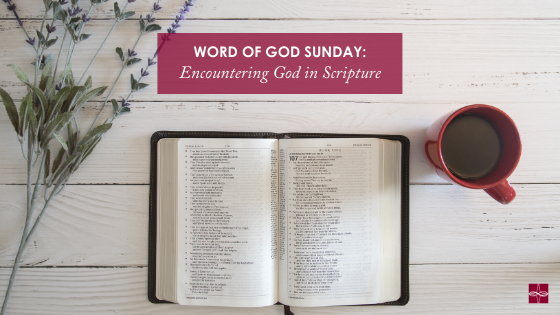
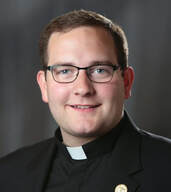
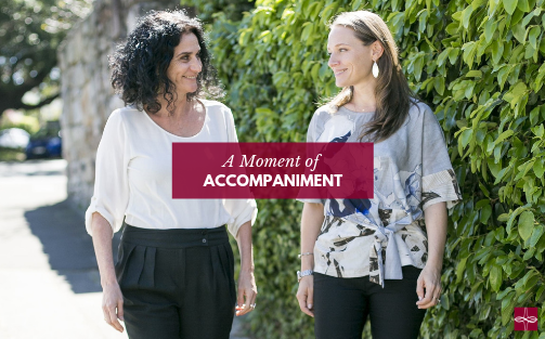

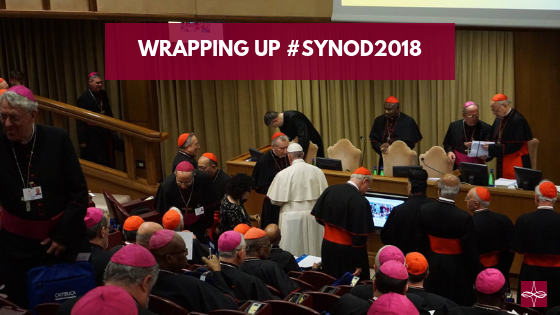

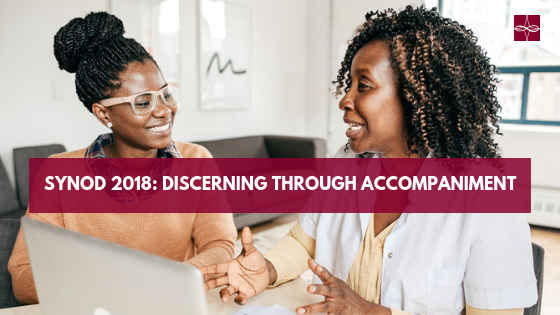

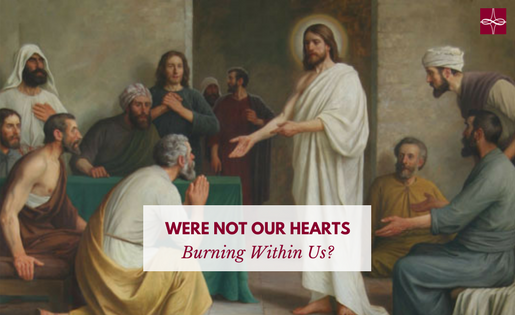
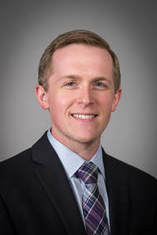

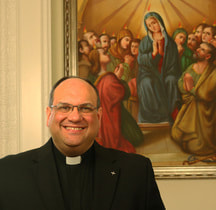
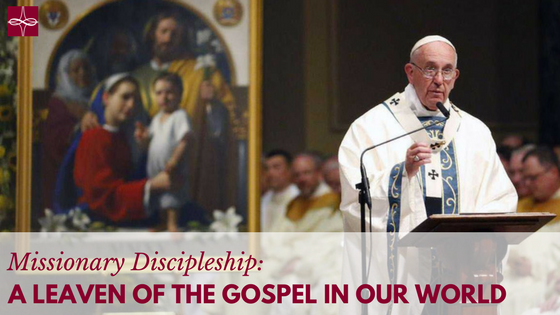
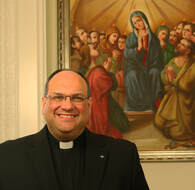
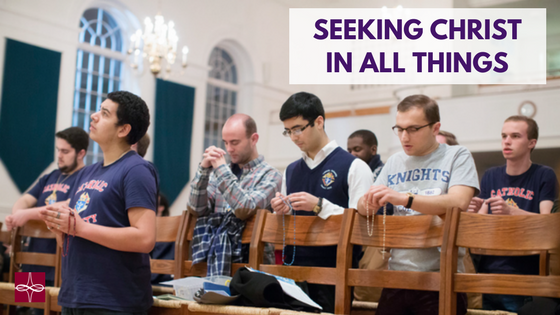
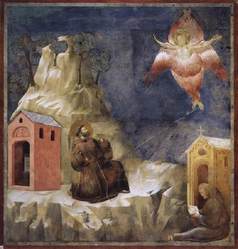
 RSS Feed
RSS Feed